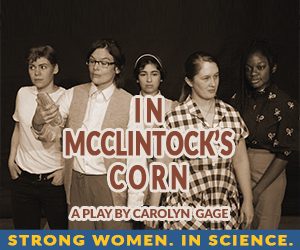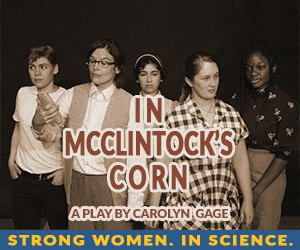
Cast of In McClitock’s Corn
Autistic trailblazing female pioneer broke boundaries with her maize DNA research, eventually earning a Nobel prize and changing the understanding of DNA.
TAMPA, FL, USA, February 21, 2023 /EINPresswire.com/ — To open their 23rd season, a season of Strong Women, on stage at Powerstories Theatre is Strong Women In Science and the world debut of Carolyn Gage’s play, In McClintock’s Corn.
Opening on February 24 and running through March 12, with global live streams on March 4 and 11, In McClintock’s Corn is the true story of little-known Nobel-prize-winning geneticist Dr. Barbara McClintock spanning five decades beginning in the 1920s.
Dr. McClintock was an autistic trailblazer, a female pioneer who broke boundaries with her maize (corn) DNA research. Despite bullying from male colleagues, she persisted in her studies. She triumphed in a male-dominated field, eventually earning a Nobel prize and changing the understanding of human genetics and DNA.
Directed by Ami Sallee, the play features Nicole Jeannine Smith as Barbara, Taylor Elyse Belew as Harriet, Angelina Martinez as Doris/Martha/Phyllis, Newt Rametta as Margaret/Carl, and Bianca Borge as Hannah/Hellen/Jim.
Set entirely in a cornfield, the story examines Dr. McClintock’s revolutionary work and her relationship with her companion/partner Harriet Creighton. It tells the story of Dr. McClintock’s revolutionary quest to understand diversity in nature and to reframe “deviance” as an expression of natural variance.
Playwright Carolyn Gage is a neurodivergent playwright, performer, director, and activist. The author of several collections of lesbian and feminist-themed plays, over seventy plays, musicals, and one-woman shows, she specializes in non-traditional roles for women, especially those reclaiming famous lesbians whose stories have been distorted or erased from history.
In 2022, In McClintock’s Corn was a National Finalist for the Jane Chambers Award, sponsored by the Women in Theatre Program of the Association of Theatre in Higher Education (ATHE).
Carolyn explained, “Barbara started her career in the 20s at Cornell. Women were not allowed to get research or teaching jobs above the lowest associate or full professorships level. She faced discrimination throughout her life. She said at one point, “I’m going to do my life the very best I can and do my research with respect for the corn to the top of my ability. That’s where my real relationship is. That’s where I’m good, and I will put it all. I can’t compete with the men. So I don’t try.'”
During the course of writing In McClintock’s Corn, Carolyn discovered that she was on the autism spectrum like Barbara.
Carolyn stressed how thrilled she was to introduce patrons to Dr. McClintock.
“I want people to know about this woman, her work, and her relationship with Harriet, one of the few people who understood her work. I want to lift up that friendship, lift up same-sex intimacy. I also finished the play before I understood she was autistic. And the year I finished it, I also was diagnosed as autistic. And I’m like, well, that’s no wonder: her life made so much sense to me. So I wanted to put autism kind of front and center and show what it looks like to do intimacy when one partner is neurotypical, and the other is autistic. It’s a different trajectory. It’s not like they fall in love, some kind of conflict gets resolved, and they move into the house with the white picket fence and live happily ever after. They didn’t throw the friendship out when they realized their differences were so extreme. They said, OK, this template – the picket fence thing isn’t going to work for us – but I love you dearly, you love me dearly, and I can track your work. They found a way. They customized their intimacy to accommodate the fact that one was neurotypical and one was from the spectrum. It’s a remarkable love story that crosses five decades. I don’t believe anything in Barbara’s life would have been the same if it hadn’t been for Harriet Creighton. Having just one person who sees who you are and is always there is absolutely key.
“Barbara kept at her research until the world grew up and was ready to see what she had to say about diversity, particularly genes and DNA. Her male colleagues really dismissed and disrespected her. She never answered to that. She just kept working, and then suddenly, the world came to its knees and gave her the Nobel Prize.”
Theatre founder Fran Powers is excited that this story that debuted in the theatre’s first Voices of Women Theatre Festival when the theatre was dark during
the pandemic is finally coming to light on stage two years later.
“We think this STEM story is so important that every show is free for STEM teachers and deeply discounted to $12 for all students,” said Fran. “Unfortunately, the themes in the 1920s are still so prevalent today. Using the playwright’s words, ‘this play is about the physical land that women and minorities are and are not allowed to occupy.’ Everyone should come to learn about Barbara’s groundbreaking story.”
Powerstories Theatre is located at 2105 W Kennedy Blvd. Tickets are $30 for adults, $25 for seniors and the military, and $12 for students. Showtimes are Thursday through Saturday at 8 pm and Sunday at 2 pm. To get more information and purchase tickets, visit bit.ly/PS_IMC. STEM teachers can get free tickets at bit.ly/PSeducators. To volunteer and see the show for FREE, visit bit.ly/IMCvolunteer
Deborah Kelley
Powerstories Theatre
deb@powerstories.com
Visit us on social media:
Facebook
Instagram
TikTok
![]()
